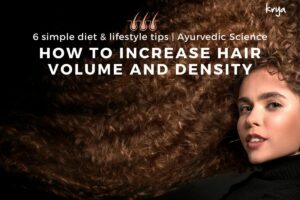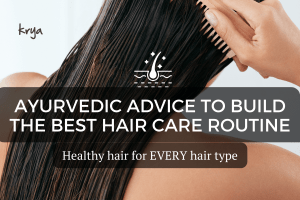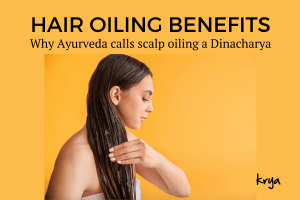This post was last updated on August 12, 2021 by Preethi Sukumaran
I just read this piece on Seth Godin’s blog and it resonated greatly with me. In this piece, Seth says that when we want to bring in a positive change, we often forget that this brings in discomfort. And acknowledging this discomfort helps everyone get on board with the positive change we are trying to bring in.
Discomfort or atleast an initial sense of un-ease goes hand in hand with a truly natural beauty routine. For example, the idea of a truly natural, synthetics free shampoo is exciting to almost everyone. But, when people see the Krya range of hairwashes (which are truly natural), they are disconcerted by the idea of using a powder based hairwash. And as we have said before, it DOES take some initial getting used to.
However, to make a truly natural shampoo which is genuinely free from synthetic surfactants, TEA, DEA, silicones, fragrances, and preservatives, we can only make a powder hairwash. Only this format ensures the product is stable, has a reasonable shelf life and does not spoil easily.

Similarly, EVERONE is now disconcerted by our assertion that hair oiling is essential not just for a healthy scalp and hair but for the entire body. Unfortunately, when it comes to hair oils, this unease is driven by 2 reasons: a) the feeling that our hair will be sticky and not look fashionable AND b) because we have now become convinced that hair oiling is unnecessary and can cause harm to our hair and scalp.
So today’s blog post will examine a few of these hair oiling myths, and we will provide both Ayurvedic and personal experiences to tell you just why hair oiling can be your biggest growth hair weapon. Read on.
Myth 1: Regular oiling attracts dirt and clogs the scalp
There is an optimum level of oiling for every scalp and this varies depending upon season, humidity levels, how frequently you are shampooing your hair, how drying and stripping your shampoo is, your diet and the time of the month (for women). With such a sensitive, changing variation in sebum levels, it is no wonder that sometimes we could get it wrong.
Also, given the level of dust, pollution and our tendency to commute a lot, it is also no secret that a lot of this dust and pollution will find its way into every exposed part of our body including our skin and hair.
But here’s another interesting fact: our face will attract the same amount of dirt, and in fact far more than our scalp will as it is not covered by hair. Yet, we are consistently told by the beauty industry to moisturise, use serums and also use thick greasy sun blocks and sunscreens. Surely a simple, natural hair oil is not going to be greasier or more dirt attracting compared to all these products, correct?

Plus, when we apply thick leave on hair serums or silicone based leave in conditioners, they are equally sticky and can attract dirt.
So it seems that the beauty industry and allied beauty service experts (salon stylists, dermatologists, and trichologists) are being extremely selective when it comes to dismissing oil because of its “special dirt attracting property”.
Here is what Ayurveda says about the Keshya abhyanga (practice of hair oiling):
At a superficial level, Keshya abhyanga helps in 2 aspects: improves circulation of the scalp and re-energizes the small blood vessels that supply nutrients to the scalp. It also helps to physically lift dirt away from the scalp and ensure it is washed away during bath, leaving the scalp clean and free from bacteria and insects.

At a more profound level, Keshya abhyanga helps to cool the scalp, channel excess heat out of the scalp through the numerous minute orifices present in the scalp. And we will explore more about this below.
BUT: all the above information is contingent on 2 things:
- The choice of the right hair oil for your scalp and hair type and external surroundings
- Usage of the correct amount of hair oil for your scalp
If the right choices are not made in these 2 things, then hair oiling will not work well for you.
Myth 2: Hair Oiling increases dandruff in the hair
We have written extensively about dandruff before. As we have said, there are 2 types of dandruff:
Dry dandruff:
The first kind is what is most common today and about 75% of those who believe they have dandruff, suffer from this kind. This dandruff is called “dry dandruff” and presents itself as a constantly shedding scalp with dry, small, white, powdery flakes.
This dandruff occurs exclusively due to 3 reasons: excessive shampooing, lack of hair oiling or because of scalp irritation due to SLS and SLeS in your shampoo.

The cure for this dandruff is to oil MORE, shampoo LESS and ELIMINATE the use of SLS and SLeS based shampoos.
Oily Dandruff:
The second kind of dandruff, which is less common, is the oily dandruff which is caused by fungal organisms like Malassezia furfur which feeds on and metabolises the sebum on the scalp. This dandruff is creamy – yellow in colour with large visible flakes that are oily in nature.
Here the hair products used need to 3 things: bring down the conditions of growth for the fungal micro organism, regularise sebum production and cut down the thickening of the scalp.
As these fungal organisms thrive in the presence of sweet, nourishing food mediums, the scalp should not be oiled with regular oils like coconut oil, almond oil, etc. These oils provide a bountiful growth medium for fungal micro organisms and will increase their growth.

Ayurveda recommends the use of specific bitter herbs to cut down fungal growth and balance sebum levels for this kind of dandruff. Typically the hair oil should contain bitters like Neeli (Indigofera tinctoria), Nimba (Azadarichta indica), Indravalli (Cardiospermum halicacapum), etc. When these herbs are used in the right base oil, they have the property of completely eliminating the fungal organism and treating the dandruff within 2 – 3 months.

At Krya, we have seen the most stubborn of dandruff respond very well to the bitters and herbs used in the Krya anti dandruff system.
Myth 3: Hair Oiling has no inherent purpose. It is unnecessary and useless.
We have spoken earlier in this piece about the benefits of hair oiling. Hair responds to the stimuli given to us and by our environment and is reactive in its growth. Similarly, our hair also acts as a barometer of our dosha balance and inner health. It is the quickest organ system to respond and show changes in its structure and appearance to indicate when pitta is out of balance (hair greying and thinning), when vata is out of balance (dryness of hair and scalp, split ends, breakage and tangling) or when kapha is out of balance (high hair fall, dandruff, poor hair growth, etc).

In Ayurveda, specific herbs are prescribed for each of these conditions. Herbs like Amla and Bhringaraj are usually indicated for pitta increased conditions. Herbs like Yashtimadhu (Indian liquorice) and Brahmi (Indian pennywort) are indicated for high vata conditions. Herbs like Neem, Indravalli are indicated when Kapha is high.
Besides illnesses, certain modern chemical treatments can also damage hair. Excessive shampooing dries out the scalp creating a high vata like imbalance. Frequent hair colouring and alkali based treatments increase the pitta in hair and vata in hair causing hair thinning, severe hair greying and loose, weak hair with high hair fall.

In each of these conditions as well, using the right hair oil with the right herbs can greatly benefit hair, treat the imbalance locally and reverse hair weakness. When the underlying dosha imbalance is corrected in the body as well, by following Dinacharya routines like the Abhyanga and by adopting the right diet and lifestyle corrections, we can see a complete reversal of the hair symptoms.
To conclude:
Any practice or product when taken out of its underlying system or context makes no apparent sense. Hair oiling makes sense when viewed in the Ayurvedic lens as a practice adopted to heal the entire body and aid hair growth.
In this context, Ayurveda recommends that hair oiling be done using specific herbs, specific base oils and applied in a particular way for each condition to be treated. When followed this way, hair oiling works precisely and specifically helping treat your hair and health condition.

When hair oiling is taken out of context and non permitted substances like Mineral oil are used without any understanding of the base oils or herbs to be sued, then obviously the hair oil does not work well for you.
But it is important to understand here that improper hair oiling or hair products did not work for you. The system of Ayurveda or the hoary practice of hair oiling is not to blame. When used well, as we have seen consistently at Krya, hair oiling works wonders in many kinds of hair issues from premature greying to hairfall related to illnesses.
We hope this post gave you a glimpse into just how powerful a practice hair oiling is and how Ayurveda helps us formulate different kinds of hair oils for different hair problems.
Krya’s extensive range of ayurvedic hair oils can be explored here:




